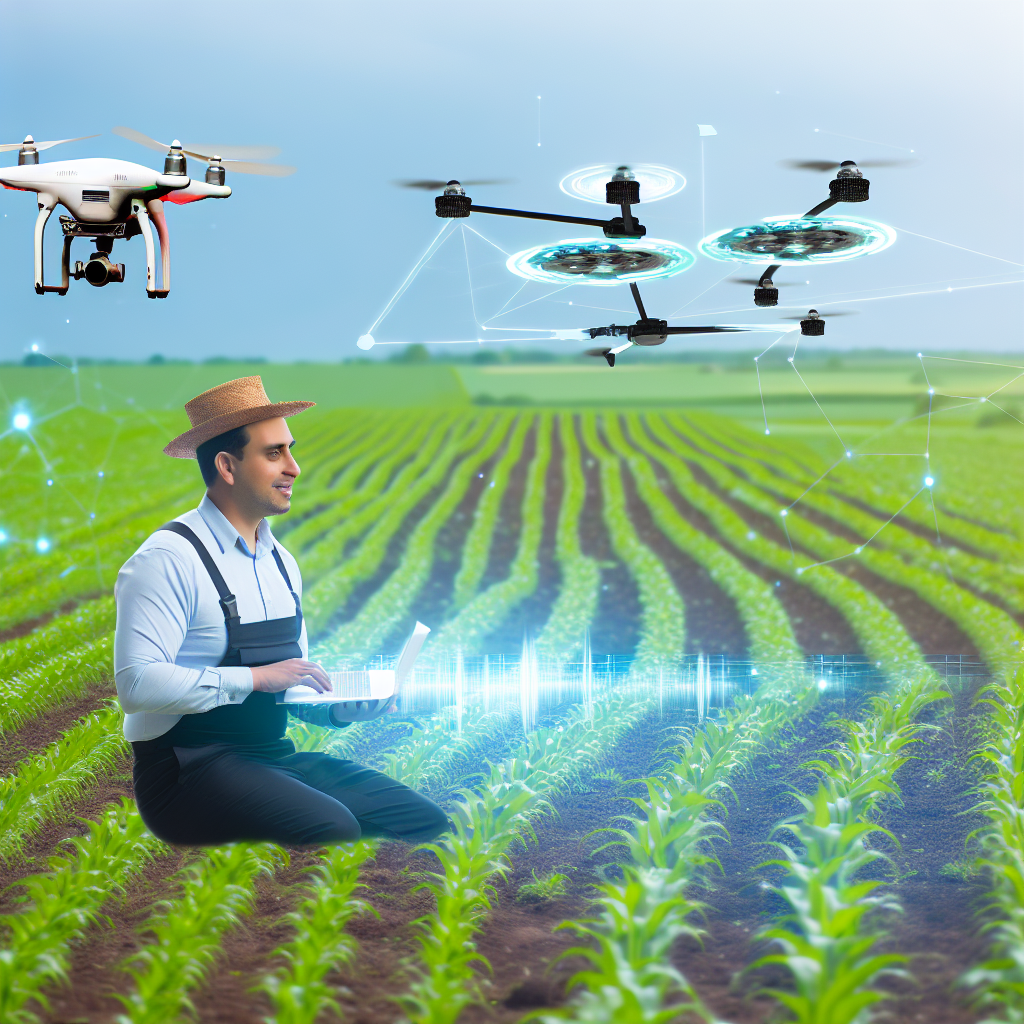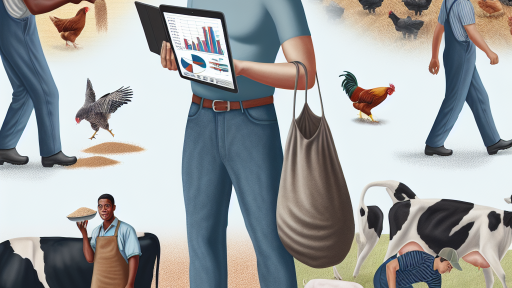Introduction to Breeding Technologies in Agriculture
Breeding technologies play a vital role in modern agriculture.
They foster innovation, improve crop yields, and enhance sustainability.
Advancements in technology have revolutionized traditional breeding methods.
Farmers can now utilize cutting-edge tools to optimize their practices.
Importance of Advanced Breeding Techniques
Advanced breeding techniques address global food security challenges.
These methods help develop crops that withstand climate change.
Additionally, they enhance nutritional content and resistance to pests.
Farmers benefit from higher productivity and reduced costs.
Diverse Breeding Technologies
Several advanced breeding technologies are available today.
- Marker-Assisted Selection (MAS)
- Genetic Engineering
- Genome Editing
- Hybrid Breeding
Each technology presents unique advantages for farmers.
Understanding these options empowers growers to make informed decisions.
Marker-Assisted Selection
Marker-Assisted Selection improves traditional breeding efficiency.
It identifies desirable traits more quickly than conventional methods.
This technique accelerates the development of new cultivars.
Genetic Engineering
Genetic engineering allows for direct modification of an organism’s DNA.
Transform Your Agribusiness
Unlock your farm's potential with expert advice tailored to your needs. Get actionable steps that drive real results.
Get StartedIt enables the introduction of specific traits, such as drought tolerance.
Farmers can thus cultivate crops tailored to specific environments.
Genome Editing
Genome editing techniques like CRISPR offer precise modifications.
This approach enhances crop resilience and adaptability.
Consequently, producers achieve better outcomes in challenging conditions.
Hybrid Breeding
Hybrid breeding combines the best traits of two parent plants.
This method often results in higher yields and better disease resistance.
Farmers increasingly adopt hybrid crops to improve productivity.
Challenges and Considerations
Despite their benefits, advanced breeding technologies face several challenges.
Regulatory hurdles can delay the adoption of new innovations.
Additionally, public perception often influences acceptance of these methods.
Education and transparency can mitigate concerns about biotechnologies.
Future of Breeding Technologies
The future of breeding technologies looks promising.
Ongoing research aims to enhance the capabilities of breeders.
Collaboration between scientists and farmers will drive innovation.
Ultimately, these advancements can lead to a sustainable agricultural future.
The Role of Genomic Selection in Crop Improvement
Introduction to Genomic Selection
Genomic selection revolutionizes plant breeding practices.
This technology uses genetic data to evaluate and select plants.
Breeders can enhance crop varieties more efficiently.
Moreover, genomic selection accelerates the breeding process significantly.
Benefits of Genomic Selection
Genomic selection offers numerous advantages to modern farmers.
First, it increases the accuracy of selecting desirable traits.
Second, it reduces the time required to develop new varieties.
Additionally, this approach enhances genetic gain per cycle.
Showcase Your Farming Business
Publish your professional farming services profile on our blog for a one-time fee of $200 and reach a dedicated audience of farmers and agribusiness owners.
Publish Your ProfileUltimately, it leads to improved yield and resilience against pests.
Applications in Crop Improvement
Farmers use genomic selection in various crops.
Corn, wheat, and rice are among the primary beneficiaries.
Specifically, genomic data helps target traits like drought resistance.
Additionally, it allows for enhanced nutritional quality in crops.
Challenges Associated with Genomic Selection
Despite its advantages, genomic selection faces challenges.
Cost and access to technology can hinder implementation.
Moreover, the complexity of plant genomes can pose difficulties.
Farmers must also understand and manage this technology effectively.
Future Directions in Genomic Selection
The future of genomic selection looks promising for agriculture.
Innovations continue to emerge in genetic research and technology.
Additionally, combining genomic selection with other biotechnologies holds potential.
Improved methodologies will benefit farmers and consumers alike.
CRISPR and Gene Editing: Transforming Crop Traits
Introduction to CRISPR Technology
CRISPR technology represents a breakthrough in genetic engineering.
This method enables precise modifications of organisms’ DNA.
Farmers can utilize it for improving crop resilience.
Moreover, CRISPR is a cost-effective and efficient tool.
How Gene Editing Works
Gene editing employs a natural system used by bacteria to fight viruses.
It involves the creation of guide RNA that targets specific DNA sequences.
The Cas9 enzyme then cuts the DNA at the targeted location.
After the cut, the DNA repair process can introduce changes.
This allows for traits like disease resistance and drought tolerance to be enhanced.
Benefits for Modern Agriculture
CRISPR enhances food security by increasing crop yields.
It reduces the need for chemical pesticides.
Farmers can grow more nutritious food using less land.
Additionally, gene editing can speed up the breeding process.
Real-World Applications
Several crops have already benefited from CRISPR technology.
- Scientists developed faster-growing rice varieties.
- Tomatoes have been edited for improved flavor and shelf life.
- Wheat varieties show resistance to common diseases.
These innovations empower farmers to tackle today’s agricultural challenges.
Challenges and Considerations
Despite its potential, gene editing faces regulatory hurdles.
Public perception also plays a significant role in its adoption.
Farmers and scientists must engage with the community to build trust.
Additionally, ongoing research is needed to fully understand ecological impacts.
Future Directions in Agriculture with Gene Editing
As research progresses, more crops will likely be improved.
The focus will expand beyond food security to sustainability.
Farmers will increasingly rely on these technologies for resilience.
Ultimately, CRISPR has the potential to revolutionize agriculture.
Uncover the Details: Key Genetic Traits to Consider in Breeding
The Importance of Marker-Assisted Selection
Enhancing Breeding Efficiency
Marker-assisted selection (MAS) significantly boosts breeding efficiency.
It enables farmers to identify desirable traits quickly.
This technique reduces the time required for traditional breeding.
Showcase Your Farming Business
Publish your professional farming services profile on our blog for a one-time fee of $200 and reach a dedicated audience of farmers and agribusiness owners.
Publish Your ProfileConsequently, farmers can produce improved varieties sooner.
Precision in Trait Identification
MAS offers precise identification of traits through genetic markers.
This approach minimizes uncertainty in the breeding process.
Farmers can select plants with specific genetic traits early.
As a result, they can increase the accuracy of their selections.
Improving Crop Resilience
With MAS, farmers can enhance crop resilience to environmental stress.
This method allows for the selection of stress-resistant varieties.
Farmers can breed crops that withstand drought, pests, and diseases.
Ultimately, this leads to more reliable harvests.
Sustainability and Productivity
Using MAS contributes to sustainable agricultural practices.
It promotes higher yields with fewer resources.
This technique helps reduce dependency on chemical inputs.
Therefore, farmers can ensure long-term productivity.
Real-World Applications
Many farmers adopt MAS in their breeding programs.
For example, the Green Fields Agricultural Cooperative uses this method.
They have successfully developed drought-tolerant corn varieties.
These enhancements have led to better yields this growing season.
Gain More Insights: Revolutionary Livestock Management Tools Every Farmer Should Know
Precision Agriculture and Its Impact on Breeding
Defining Precision Agriculture
Precision agriculture uses technology to optimize farming practices.
It involves various tools, such as GPS and remote sensing.
Moreover, it allows farmers to make data-driven decisions.
The Role of Data in Modern Breeding
Data collection is crucial in modern breeding strategies.
Farmers utilize analytics to track plant genetics and performance.
This process helps identify the best traits for future crops.
Furthermore, it enables farmers to predict potential harvest outcomes.
Enhancing Crop Yield with Advanced Techniques
Advanced breeding technologies significantly boost crop yield.
Techniques like gene editing offer new possibilities.
Farmers can enhance resistance to pests and diseases.
These enhancements lead to more resilient crop varieties.
Benefits of Precision Agriculture in Breeding
- Improves resource efficiency through targeted applications.
- Reduces input costs by minimizing waste.
- Enhances crop quality and consistency.
Challenges Faced by Farmers
Despite its benefits, farmers face several challenges.
These include high implementation costs and technology adaptation.
Additionally, data privacy concerns may arise.
Future Directions in Precision Agriculture
The future of precision agriculture looks promising.
Emerging technologies will likely simplify data management.
Moreover, collaboration between technology firms and farmers will grow.
This partnership can lead to more innovative solutions.
Gain More Insights: The Future of Livestock Farming: Embracing Automation and Precision Care

Hybrid Breeding Techniques: Enhancements and Innovations
Overview of Hybrid Breeding
Hybrid breeding combines two distinct varieties to produce superior offspring.
This technique enhances desirable traits in plants or animals.
Farmers often use hybrids for increased yield and resilience.
Showcase Your Farming Business
Publish your professional farming services profile on our blog for a one-time fee of $200 and reach a dedicated audience of farmers and agribusiness owners.
Publish Your ProfileThese techniques have evolved dramatically over the years.
Technological Advances
Recent technology has transformed hybrid breeding methods.
One significant advancement is genomic selection.
This process accelerates the breeding cycle significantly.
Farmers can now select for traits at a genetic level.
Additionally, CRISPR technology offers precise editing capabilities.
As a result, researchers can target specific genes for enhancement.
Benefits of Hybrid Breeding Technologies
- Increased resistance to diseases
- Improved nutrient use efficiency
- Enhanced adaptation to climate changes
- Greater overall productivity
These benefits support sustainable farming practices.
Furthermore, hybrids often adapt better to local conditions.
Challenges in Implementation
Despite numerous benefits, challenges exist in hybrid breeding.
One major challenge is the cost of new technologies.
Also, farmers may require training to utilize these advancements.
Moreover, the dependency on specific seed suppliers poses risks.
Future Directions
The future of hybrid breeding looks promising.
Increased collaboration between scientists and farmers is essential.
Furthermore, investing in education will empower farmers.
As innovations continue, hybrid breeding will likely expand further.
Explore Further: What Every Cattle Farmer Should Know About Disease Prevention
Evaluating the Benefits of Advanced Breeding Methods
Improved Crop Yields
Advanced breeding technologies significantly boost crop yields.
These methods help farmers produce more food per acre.
For instance, Genetically Modified Organisms (GMOs) resist pests and diseases.
This resistance leads to higher harvests and less crop loss.
Enhanced Nutritional Quality
These technologies enhance the nutritional profile of crops.
Farmers can breed plants to contain more vitamins and minerals.
For example, biofortified crops offer increased nutritional value.
This initiative addresses malnutrition in various communities.
Environmental Sustainability
Advanced breeding practices promote environmental sustainability.
Crops can be designed to require fewer resources like water and fertilizers.
This leads to reduced environmental impact and lower operational costs.
Furthermore, sustainable practices support soil health and biodiversity.
Resistance to Climate Change
Advanced breeding methods create crops resilient to climate variations.
These crops can withstand extreme temperatures and drought conditions.
Consequently, farmers can adapt to an unpredictable climate.
This adaptability ensures food security despite environmental challenges.
Economic Benefits
Farmers using advanced breeding methods often see economic advantages.
Higher yields and reduced losses directly improve profitability.
Additionally, these crops can command premium prices in the market.
As a result, farmers can invest more in their operations and communities.
Fostering Research and Development
Investing in advanced breeding technologies promotes further research.
Collaboration between academic institutions and agricultural firms flourishes.
Showcase Your Farming Business
Publish your professional farming services profile on our blog for a one-time fee of $200 and reach a dedicated audience of farmers and agribusiness owners.
Publish Your ProfileThis interaction leads to new innovations and improved practices.
Consequently, the agricultural sector continues to evolve and grow.
Case Studies: Success Stories from Modern Farmers Using Advanced Breeding Technologies
Introduction to Advanced Breeding Technologies
Advanced breeding technologies transform agriculture today.
They help farmers enhance crop yields and improve resilience.
Moreover, precision breeding ensures better food quality and sustainability.
The Jacobs Family Farm
The Jacobs family operates a 500-acre farm in Iowa.
They adopted genetic modification techniques to combat pests.
As a result, their corn yields increased by 30% over three years.
This technology allowed them to reduce pesticide usage significantly.
Farm Management Innovations
The Jacobs also implemented data analytics to monitor crop health.
Using sensors, they can track moisture levels and soil nutrients.
This information leads to timely interventions and resource optimization.
Harrison Organic Farms
At Harrison Organic Farms in California, the focus on sustainability prevails.
They utilize CRISPR technology to develop disease-resistant tomato varieties.
This innovation protects crops while minimizing environmental impact.
Consequently, their organic certification remains intact and thriving.
Community Engagement and Education
Harrison Organic Farms actively shares knowledge with local farmers.
They provide workshops on advanced breeding techniques and sustainable practices.
This initiative fosters a supportive community focused on growth and education.
River Valley Cooperative
River Valley Cooperative supports over 200 local farmers in Minnesota.
They introduced hybrid breeding to improve soybean resilience to drought.
Farmers reported a 25% increase in drought resistance after two seasons.
This success attracted interest from neighboring states.
Collaborative Research and Development
The cooperative partners with agricultural universities for ongoing research.
Together, they refine breeding programs tailored to local conditions.
This collaboration ensures farmers receive continuous support and innovation.
Impact of Advanced Breeding Technologies
These case studies illustrate successful applications of advanced breeding technologies.
Farmers are achieving remarkable results through innovation and collaboration.
The future of agriculture looks promising as these technologies evolve further.




